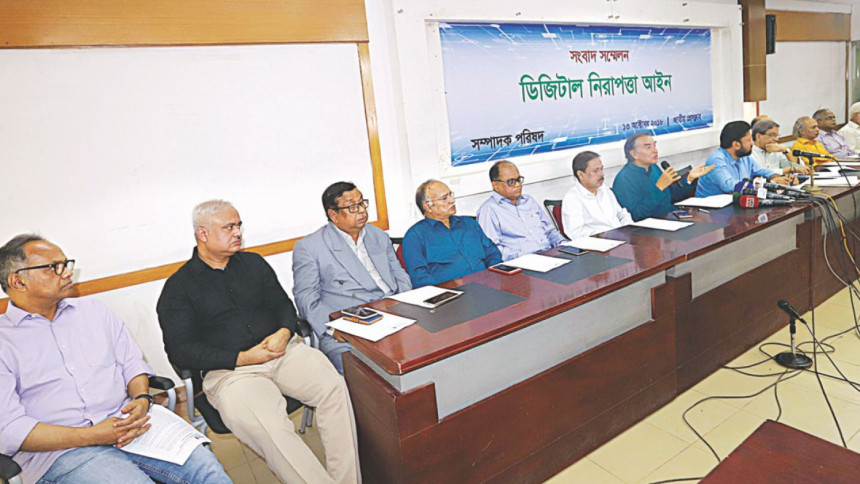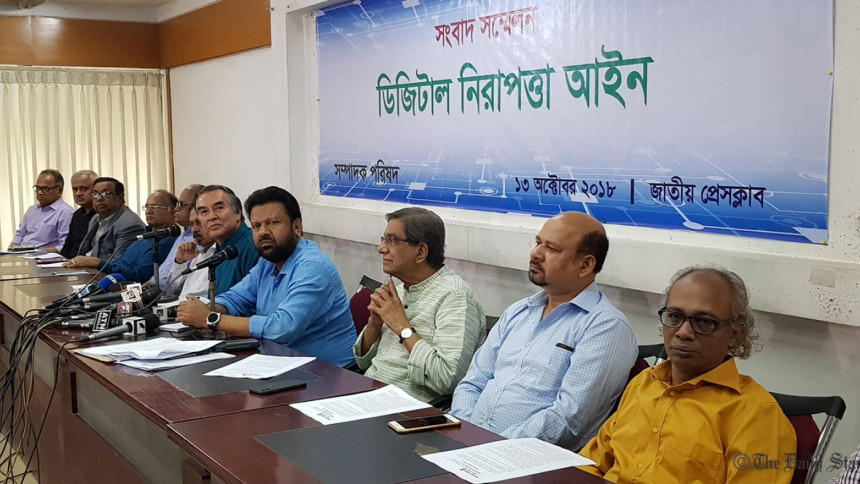Digital Security Act: Human chain tomorrow

The Sampadak Parishad (Editors' Council) will form a human chain in front of the Jatiya Press Club tomorrow to press for proper amendments to nine sections of the Digital Security Act, saying those are likely to seriously harm the cause of independent journalism and freedom of expression.
The Parishad, a platform of editors of the country's national dailies, announced the programme during a news conference at the Press Club yesterday. Only members of the Parishad will take part in the human chain, scheduled for 11:00am.
“Sections 8, 21, 25, 28, 29, 31, 32, 43, and 53 of the Digital Security Act must be amended appropriately to safeguard freedom of the media and freedom of speech,” said a written statement of the Parishad, read out by Bhorer Kagoj Editor Shyamal Dutta.
Sixteen editors of leading national dailies were present at the press conference.
Pointing to its earlier postponed human chain, the Parishad yesterday said that after the passage of the bill in parliament on September 19, it announced it would hold a human chain in front of the Jatiya Press Club on September 29.
The event was postponed at the request of Information Minister Hasanul Haq Inu, who also promised to bring the law minister and the posts, telecommunications and IT minister to a discussion with the editors on September 30.
The three ministers, in the September 30 meeting, publicly committed to taking the editors' concerns to the cabinet meeting either on October 3 or the next one on October 8, the Parishad said.
The ministers also promised to seek the cabinet's approval for resuming discussion with the editors and that all efforts would be made to work out a version of the law acceptable to all concerned, it added.
“Regrettably, neither such efforts were made, nor were we extended the courtesy of being informed by any of the ministers as to why they failed to keep their promise,” read the statement.
“The above account amply proves that the Sampadak Parishad cooperated fully with the government and parliament to make a law that was acceptable to all stakeholders. However, all our efforts for cooperation failed.”
The Parishad yesterday demanded that the government bring amendments to the law in the last session of the current parliament, scheduled to begin on October 21.
On section 43, it said a prior order from the High Court must be obtained in blocking or confiscating any computer system of a media house.
The section states that if a police official believes that an offence under the law has been or is being committed at a certain place, or there is a possibility of committing crimes or destroying evidence, the official can search the place or any person there.
The officer, upon putting in writing the reason for his/her belief, also can seize the computer, computer system, computer network, data and information or other objects that can help prove the crime while conducting a search at the place.
Besides, police can arrest anyone present at the place without any warrant if he or she is suspected of committing or having committed a crime under this law.
The Parishad said, “In cases of offences relating to performance of journalistic duty by media professionals, they must be issued summons to appear before a court [as is the law now], and under no circumstances should media professionals be detained or arrested without warrant and due process of law.”
The platform also demanded that in instances of offences made by media professionals, it should be routed through the Press Council to establish a prima facie case. For this purpose, the Press Council may be strengthened appropriately, it said.
In his inaugural speech, Sampadak Parishad General Secretary and The Daily Star Editor and Publisher Mahfuz Anam said the platform had never rejected the Digital Security Bill or never demanded that the Act be scrapped.
“We only repeatedly demanded amendment to some sections which we think are against independent journalism,” he added.
Pointing to the Indian Supreme Court's verdict regarding the country's Information Technology Act, Mahfuz Anam said the Indian apex court declared section 66A of IT Act unconstitutional and struck it down.
According to media reports, section 66A had been widely misused by police in various states to arrest innocent persons for posting critical comments about social and political issues and political leaders on social networking sites.
The Indian court said such a law hit at the root of liberty and freedom of expression, two cardinal pillars of democracy.
In Bangladesh, there was almost a similar provision in the ICT Act -- section 57 -- which was widely abused to harass free thinkers and journalists.
In the face of widespread criticism, the government repealed the section but kept its contents in several provisions in the Digital Security Act.
Mahfuz Anam said the Sampadak Parishad thinks there should be a strong and enriched law in Bangladesh over cyber security and the government should take tougher stance regarding cyber security.
Pointing to its September 30 meeting with law minister, information minister, posts, telecommunications and IT minister and the Prime Minister's media adviser, the Parishad yesterday said, “Nothing was done in spite of public commitment by three ministers and media adviser to the PM to raise our concerns to the cabinet and open a dialogue with the stakeholders to work out acceptable changes in the Digital Security Act.

“We consider it to be a breach of the trust that the Sampadak Parishad had reposed on the three ministers.
“On several occasions, we met with the law and the ICT ministers and were assured of due consideration. When the bill was being scrutinised by the parliamentary standing committee on the posts, telecommunications and IT ministry, the representatives of Editors' Council, BFUJ and ATCO were invited, and we had two meetings.
“In these meetings, we raised our objections point by point and shared our concerns in details. The promise of a third meeting [with the Jatiya Sangsad committee], which might have helped reach agreements on many important points, was not met for reasons still unknown to us.”
Later, the Parishad also said, the Jatiya Sangsad committee completed scrutiny of the Bill and placed its report in the House with recommendation for its passage without meeting any of its basic demands.
It was passed without any significant changes that could have addressed the main concerns of the journalists, especially dealing with media freedom and freedom of speech.
In fact, a last-minute change was brought about which further strengthened the hands of police to enter newspaper offices and media establishments, search, block and confiscate digital networks and even to arrest journalists without warrant, added the Parishad.
Reiterating its position over the Act, it said the Digital Security Act is against the fundamental rights guaranteed in the constitution, against the spirit of freedom enshrined in the Liberation War, against the fundamental values of ethical and independent journalism.
The Parishad reiterated that the Act will create an atmosphere of fear and intimidation, which will make journalism and, specially investigative journalism, virtually impossible.
The law will create panic among all users of computers and computer networks in addition to the media, it added.
President Abdul Hamid on October 8 signed the Digital Security Bill into law amid widespread criticism.
Termed draconian at home and abroad, the bill was passed in parliament on September 19, ignoring concerns of journalists and rights defenders and keeping a harsh provision that allows police officials to search or arrest anyone without a warrant.














Comments